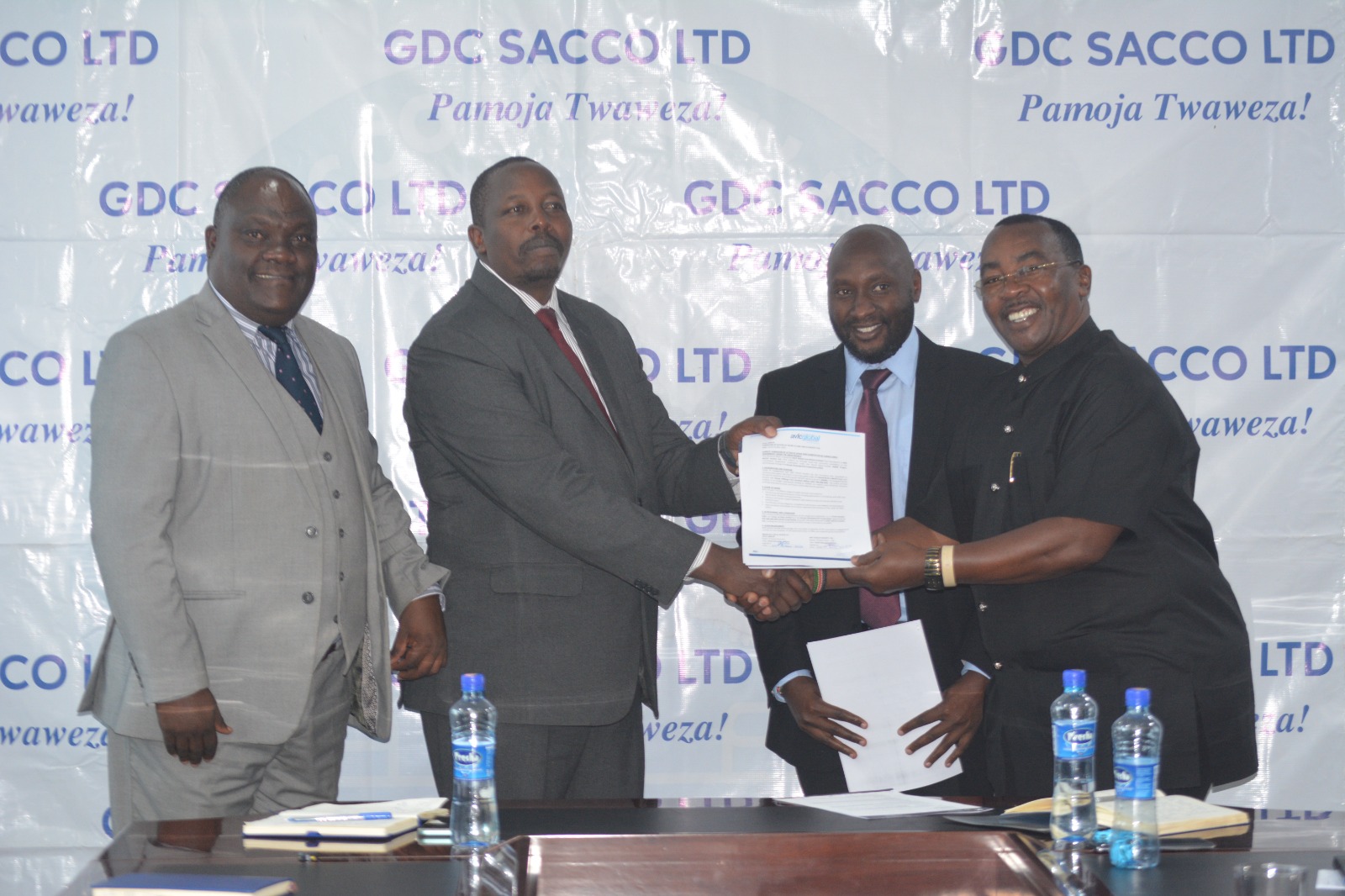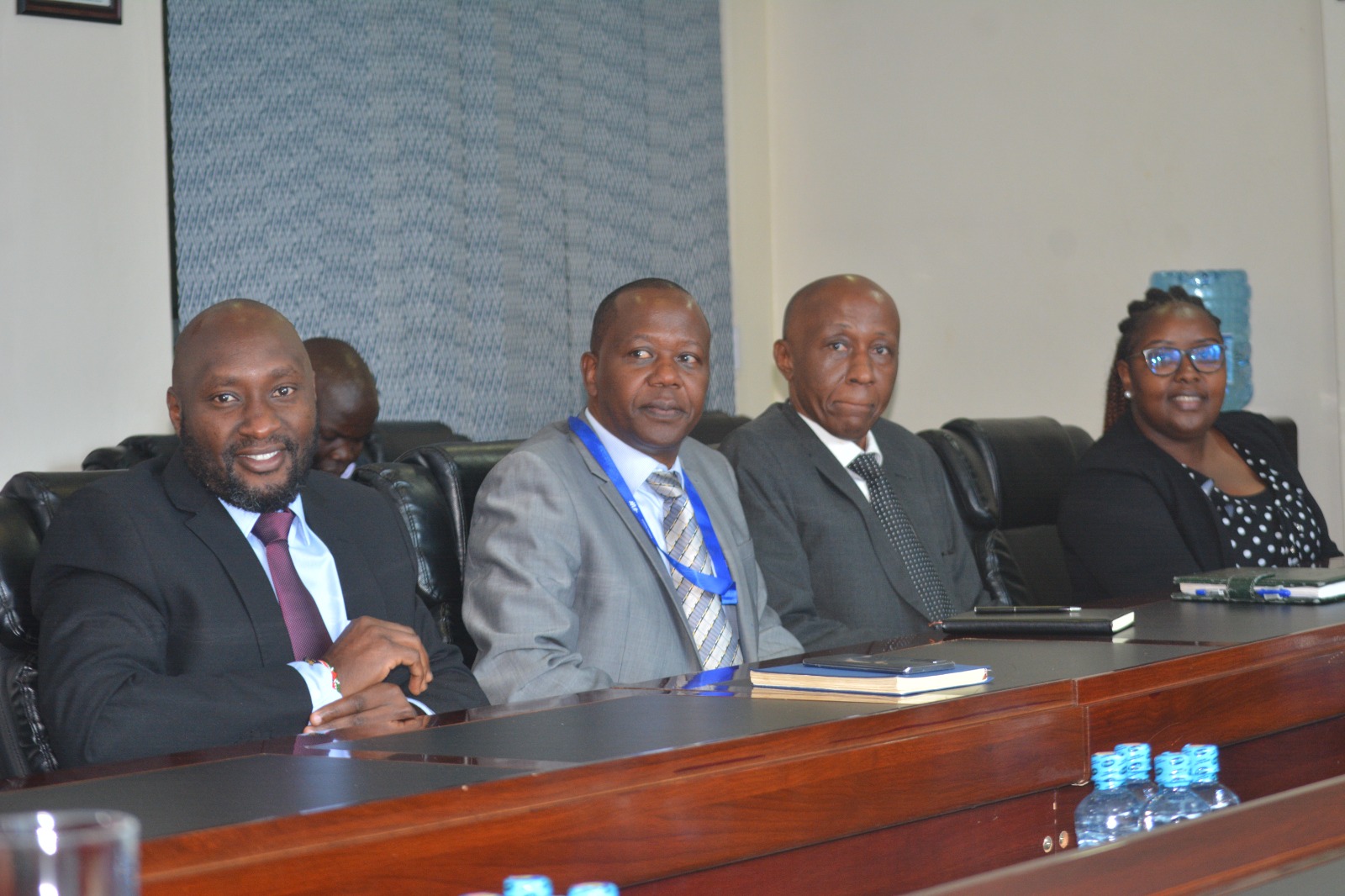
 From left: GDC Sacco CEO Charles Kioko, chairman Mburu Gitau, AVLC CEO Andrew Kanyutu and MSMES chairman James Mureu during the signing of a letter of offer for Sh500m funding from World Bank to the Sacco at the Githunguri offices in Kiambu county on October 22, 2025. /TITUS MWANGI
From left: GDC Sacco CEO Charles Kioko, chairman Mburu Gitau, AVLC CEO Andrew Kanyutu and MSMES chairman James Mureu during the signing of a letter of offer for Sh500m funding from World Bank to the Sacco at the Githunguri offices in Kiambu county on October 22, 2025. /TITUS MWANGIBehind every thriving farmers’ market and dairy collection centre lies a network of cooperative institutions that keep Kenya’s agricultural economy alive.
One such institution, Githunguri-based GDC Sacco Limited, has achieved a milestone that could redefine rural finance.
Through the support of consultancy firm AVL Consulting (AVLC Group), GDC Sacco has successfully secured Sh500 million from the World Bank’s Safer Fund - a financing boost expected to empower thousands of smallholder farmers and micro-entrepreneurs.
The partnership between GDC and AVLC, formalised through a signed letter of offer, represents more than a financial transaction.
It is a lifeline for farmers, small businesses and rural communities still recovering from the economic shocks of the Covid-19 pandemic.
Across Kiambu county’s villages and market centers, the announcement has been met with optimism and renewed hope.
The fund will enable farmers to access affordable, mobile-based loans to purchase quality dairy equipment, upgrade cowsheds, buy animal feed, and expand milk production.
For farmers like Jane Wambui, a dairy producer from Githunguri, affordable credit could mean the difference between surviving and thriving.
“I have struggled for years to expand my dairy herd because of high loan interest rates,” says Wambui.
She adds: “If GDC can give us affordable loans through our phones, then we can finally grow our farms and take care of our families.”
This transformation is what GDC CEO Charles Kioko calls a “defining moment” in the Sacco’s journey toward financial inclusion and rural empowerment.
“We are signing a letter of offer for funds from Safer that were released by the World Bank through our consultant, AVLC,” Kioko said during the signing ceremony.
According to Kioko, the journey to secure the funds began last year. “We thank God for this milestone,” he said.
“The funds will enable us to expand access to affordable credit, especially for our farmers and small businesses who form the backbone of our economy.”
Once disbursed, farmers and traders will be able to access loans starting from a minimum of Sh100,000.
At the center of this achievement is AVLC, a global consultancy firm that guided GDC through the complex process of accessing international funding.
AVLC CEO Andrew Kanyutu explained that the firm’s mission is to connect global capital with local institutions in a way that ensures accountability and measurable impact.
“Our global approach is to ensure financial inclusion and the only way to do that is to work with institutions that are regulated and structured, just like GDC,” Kanyutu said.
He added that AVLC’s focus is to reach the bottom of the pyramid by seeking wholesale funds distributed through retail channels such as Saccos.
“This ensures that the impact is measurable in the short, medium, and long term,” he stated.
Kanyutu noted that many local financial institutions often miss out on global funding opportunities due to poor structuring or presentation.
“We guided GDC every step of the way to ensure their proposal met the standards required by international lenders. This partnership shows how local cooperatives can tap into global funding to support farmers,” he said.
“Our job was to bridge the gap between the borrower and the lender by analysing, involving stakeholders, and structuring the process properly.”
For years, the high cost of borrowing has locked many small farmers out of credit.
Lenders often view them as risky borrowers with little collateral. But Kanyutu said AVLC’s approach helps to minimize risk through transparent distribution and effective risk management systems.
“At times, the cost of funds is high because of risk,” he said.
“By managing risks through partnerships with Saccos like GDC, lenders gain confidence. Additionally, by involving insurance and other stakeholders, we reduce the burden on the end borrower.”
He emphasised that sustainable lending goes beyond profit.
“In every shilling lent, there should be a component ensuring that the client is able to repay. That’s the holistic approach we promote, one that balances the lender’s security with the borrower’s sustainability,” said Kanyutu.
For GDC, accessibility, affordability, and convenience remain central to its strategy.
The Sacco plans to roll out a fully digital lending platform to make funds easily accessible to members nationwide.
“Now that we have addressed affordability, the convenient way is to make it digital,” said Kioko. He added that Kenya is among the global leaders in digital inclusion, driven by mobile technology and fintech innovation.
Through this platform, farmers will be able to access short-term loans ranging from one to six months directly from their mobile phones, eliminating paperwork and lengthy approval processes.
“Our vehicle is strictly digital, small amounts of money growing the micro, small, and medium enterprises sector,” Kioko explained. He said GDC already has a clear strategy to ensure these funds reach members digitally and create measurable community impact.
The story of GDC Sacco is one of steady growth and transformation.
Established in 2003 as a Back Office Service Activity (BOSA) with 428 members, it initially served dairy farmers in Githunguri. By 2006, it had launched Front Office Service Activity (FOSA) operations, providing reliable banking services to dairy farmers.
In 2008, it expanded to include non-dairy farmers and rebranded as Githunguri Dairy and Community Sacco Limited.
By 2012, as membership spread across counties and even into the diaspora, it evolved into GDC Sacco Limited, a modern financial cooperative with national ambitions.
 AVLC CEO Andrew Kanyutu (left) with other officials during the signing of the agreement on October 22, 2025. /TITUS MWANGI
AVLC CEO Andrew Kanyutu (left) with other officials during the signing of the agreement on October 22, 2025. /TITUS MWANGICurrently, GDC boasts over 70,000 account numbers and a membership of more than 38,000, supported by a strong digital infrastructure promoting inclusivity and efficiency.
While the Sh500 million fund is a major breakthrough, both GDC and AVLC view it as the start of a broader vision for sustainable growth.
According to Kanyutu, AVLC is already exploring additional partnerships with multilateral and bilateral financiers to unlock more resources for Kenya’s cooperative sector.
“The Sh500 million is just the beginning. We’re engaging with other global and virtual funding platforms that are liberalising the financial market. Our goal is to position African institutions like GDC to tap into global finance and eventually become lenders themselves within the continent,” he said.
He added that AVLC’s long-term mission is to become an African baseline finance institution, bridging the gap between international lenders and local borrowers.
“We met GDC and understood their business model, clientele and sustainability approach. They scored very high in terms of impact potential. Our partnership is not just about funding, it’s about building capacity, resilience and long-term growth," Kanyutu said.
The financing is expected to create jobs, stimulate local production and strengthen agricultural value chains.
Most importantly, it will restore hope among rural families whose livelihoods were disrupted by economic uncertainty.
“This funding is not just about numbers, it is about people,” Kioko said.
“It’s about restoring dignity to the hardworking men and women who feed this nation. It’s about giving them the tools to grow, to thrive, and to build a better future.”















